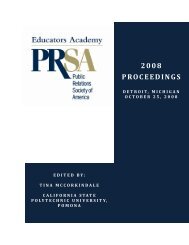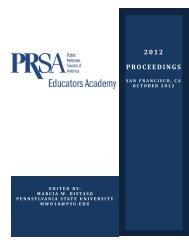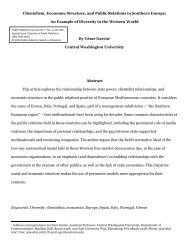2010 - Public Relations Society of America
2010 - Public Relations Society of America
2010 - Public Relations Society of America
Create successful ePaper yourself
Turn your PDF publications into a flip-book with our unique Google optimized e-Paper software.
In a separate publication (<strong>2010</strong>), Bauerlein wrote that high-school English teachers face a<br />
stiff challenge in overcoming such attitudes in the digital age. “With the digital age, the English<br />
teacher’s task has turned into Mount Everest,” he wrote. “Kids see and say more words than ever<br />
before, but their texts and posts and e-mails have only made them less disposed to study the<br />
medium. By the time they reach their senior year <strong>of</strong> high school, students have internalized a<br />
sense <strong>of</strong> expression that teachers must labor mightily to dislodge. Their verbal intelligence has<br />
been formed in a crucible <strong>of</strong> keyboards and “send” buttons, where language is all about<br />
communication, not craft.”<br />
The High School to College Transition<br />
Substantial research demonstrates that high school graduates are not prepared to write at<br />
the college level. According to Knudson et al. (2008), a growing number <strong>of</strong> incoming university<br />
freshman need remediation in reading and writing before they can take university-level<br />
coursework. This places a heavy burden on both the student and the university faculty. The<br />
authors predict this trend will escalate throughout the country. In a separate study, Attewell et al.<br />
(2006) found that the ranks <strong>of</strong> students needing remediation include large numbers <strong>of</strong> students<br />
who successfully completed college preparatory tracks in high school.<br />
This disconnect may be partially explained by a pair <strong>of</strong> 2006 studies by The Chronicle <strong>of</strong><br />
Higher Education. Here, researchers found that college pr<strong>of</strong>essors are much more concerned<br />
than high-school teachers about the writing abilities <strong>of</strong> freshmen. Nearly 44% <strong>of</strong> university<br />
faculty members said that students are not well prepared for college-level writing, compared with<br />
only 10% among high-school teachers. Conversely, only 6% <strong>of</strong> pr<strong>of</strong>essors viewed students as<br />
very well-prepared writers, while 36% <strong>of</strong> high-school teachers held this view.<br />
Other critics have faulted the English instruction that some students receive in universitylevel<br />
courses. In 2006, Miller wrote that at many universities, English 101 is now based on a<br />
“postmodern” approach taught by composition theorists who are more concerned with process,<br />
collaboration, and individual expression than with mechanics, paragraph structure, or studying<br />
classic literary works. In Miller’s view, such an approach fails to prepare students to write in<br />
upper-level classes and produces students who cannot conform to strict conventions <strong>of</strong> spelling,<br />
mechanics, and usage required for career employment. Miller concludes that the postmodern<br />
approach is founded on fallacies and produces poor results. “Hundreds <strong>of</strong> thousands <strong>of</strong> recent<br />
college graduates today cannot express themselves with the written word,” wrote English<br />
pr<strong>of</strong>essor Stanley Ridgeley in the article. “Why? Because universities have shortchanged them,<br />
<strong>of</strong>fering strange literary theories, Marxism, feminism, deconstruction, and other oddities in the<br />
guise <strong>of</strong> writing courses. They’ve <strong>of</strong>fered everything, really, but the basics <strong>of</strong> writing.” In a<br />
“back to basics” argument, Miller contends that college instructors should teach writing<br />
strategies in class rather than having students work in groups, design and use systematic<br />
grammar reviews, schedule frequent conferences with students, and require students to read and<br />
write about classic literature.<br />
California State University has attempted to diagnose and improve the writing skills <strong>of</strong><br />
high-school graduates with the California Early Assessment Program, a collaboration among the<br />
university, the California Department <strong>of</strong> Education and the California State Board <strong>of</strong> Education.<br />
The program provides California high school 11 th -graders with an early indication <strong>of</strong> whether<br />
they are ready for college-level work in English and mathematics. Students who do not<br />
demonstrate readiness can pursue more intensive high-school classes to prepare for college-level<br />
work. Although the concept shows promise, Tierney and Garcia noted in 2008 that many<br />
students, especially those from underrepresented and low-income groups, are failing the high-<br />
122
















